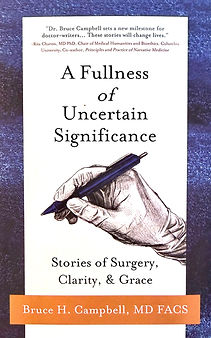- Bruce Campbell MD
- Jan 11
- 2 min read
Updated: Jan 13
One day during my internship in 1980, an older surgeon was supervising me while I performed a tonsillectomy under general anesthesia. As we worked, he told me a story he heard from one of his mentors, a surgeon who trained early in the twentieth century. My teacher swore the story was true.
Back in those days, many of the old timers performed tonsillectomies under local anesthesia using topical and injected cocaine with the patient sitting up on a table facing the surgeon. This particular doctor routinely performed tonsillectomies using a guillotine-like device called a Sluder tonsillotome in his office’s minor procedure room before seeing his morning list of clinic patients. He would stick two gauzes in the patient's mouth and have one of the nurses keep watch while he ran back-and-forth between clinic and the procedure room to check on things. If everything went well, he would send the patient home in an hour or two. Like many in that generation, the old doctor swore he never had any complications or bleeding.
One morning, the old doctor did a tonsillectomy on a businessman who was some sort of local big shot or captain of industry. After the procedure, the surgeon started clinic.
Very quickly, the office schedule spun out of control. As the doctor struggled to get things back on track, the phone rang and the doctor dashed off to the hospital to deal with a series of emergencies. He was busy all afternoon and into the early evening. Unfortunately, he forgot all about his tonsillectomy patient. Exhausted, he headed home.

Just as he was finishing dinner and was prepping his evening cigar, he remembered the businessman. He rushed back to the office and, sure enough, the man was still sitting in the procedure room with the gauze pads in his mouth. The nurse was still there, as well. She was plenty steamed but did not let on.
The doctor strapped on his head mirror, carefully slipped out the pads, and searched diligently for any problems. “The tonsil beds look fine," he pronounced. "No bleeding.”
The businessman nodded and looked at the doctor expectantly. The doctor nodded gravely, pulled out his pocket watch, tapped the crystal a couple of times, and leaned back against a counter.
After waiting two additional minutes, the doctor tucked the watch back into the pocket of his waistcoat. He asked the man to open wide. "Well," he intoned, "I usually wait a bit longer, but since you are doing so well and I trust you to call if there are problems, I am inclined to send you home. Would that be all right?" The patient nodded. The doctor clapped the man firmly on the shoulder and asked him to return in a week for a recheck.
Long story short, the businessman was overwhelmingly grateful for the outstanding and attentive care. Over the years, he sent many, many friends and associates to the doctor.
The doctor dropped a note to the businessman whenever a new patient made an appointment. Wisely, he also bought a bouquet of flowers each time for his nurse, as well.
________
A Tonsillectomy Tale from the 1930s
















